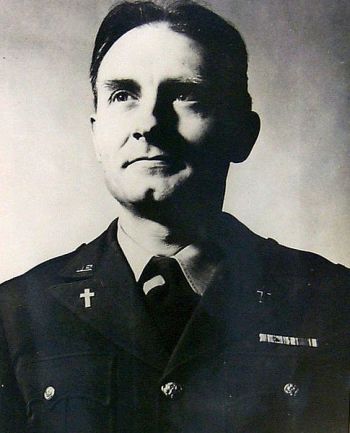Catholic Medal of Honor chaplain is sainthood candidate
The Catholic Church is investigating the Rev. Emil J. Kapaun, posthumously awarded the U.S. Congressional Medal of Honor by President Barack Obama last week, for sainthood.
Kapaun, a priest from Kansas, was given the Medal of Honor for his heroics in the Korean War.

He died in a North Korean prisoner of war camp in 1951 at the age of 35.
The process of canonization within the Roman Catholic Church begins informally when there is a groundswell of devotion emerging from the laity, according to the Father Flanagan League, an organization which documents such cases.
Those advocating for an individual's sainthood obtain a postulator who petitions the bishop to open a "cause", or case, to consider the evidence for possible sainthood.
Once a group of bishops have determined there is merit in the case, the candidate is declared a "Servant of God" by the Catholic Church.
This is the status Kapaun holds.
The postulator in Kapaun's case says the awarding of the Medal of Honor to the deceased Army chaplain could help his case for canonization.
"It shows that Father Kapaun is more than somebody being honored by the Catholic Church," said Rev. John Hotze in the Wichita (Kan.) Eagle.
Hotze has investigated the priest's case for 15 years for the Wichita Dioecese.
"He transcends matters of faith", he said.
Eugene Gerber, a former bishop of the Diocese of Wichita, also indicated in the Eagle that being a Medal of Honor recipient would be looked upon favorably by the Vatican since it monitors public opinion in sainthood cases.
"Such public recognition will catch the attention of the multitudes, increase the prayerful devotion to him locally, and adds significantly to the cause for his canonization by the Church", said Gerber.
Kapaun's was awarded the Medal of Honor for his valor during a battle his unit participated in Unsan, Korea from Nov. 1-2, 1950.
Kapaun gave medical aid and comfort to soldiers even though he was under withering fire.
In addition, he helped wounded soldiers, retrieving them from no-man's land and staying behind with them despite imminent capture.
When he and his fellow soldiers were captured, Kapaun saved the life of one of them by rushing to push away the rifle of a Chinese soldier who was about to execute the wounded man.
The soldier he saved, Herbert A. Miller, was present at the awards ceremony in the White House.
While in captivity as a prisoner of war, Kapaun gained the respect and admiration of his comrades.
Kapaun risked punishment by sneaking out of his quarters at night to scrounge for food for the starving POWs.
He ministered to them at the camp and tended to the sick and dying.
Kapaun offered his own clothes to the freezing men.
He also stood up to the abuse and mocking of his Chinese guards. One of them told Kapaun that his God must not exist because he was not being rescued from his plight.
According to a biography of the priest written by Father Arthur Tonne, Kapaun replied, "God is as real as the air they breathed but could not see, as the sounds they heard but could not see, as the thoughts and ideas they had had or spoke, but could not see or feel."
The priest also converted several of his fellow soldiers to faith in Christ.
Kapaun continued to minister despite a blood clot in his leg. Eventually, he also developed dysentery and pneumonia.
Kapaun was removed to the camp hospital, a virtual death sentence since soldiers hardly ever returned from there. His fellow comrades say he quoted Jesus before being taken away.
"Father, forgive them, for they know not what they do," he said.
Kapaun died at the hospital in May, 1951.
The U.S. government has long been pressed by surviving POWs to award the Medal of Honor to Kapaun.
His life and actions were their primary recollection of the events in the camp.
When they were released, they took with them a wooden crucifix they had carved in his memory.
As the case for Kapaun's canonization proceeds, the Church will investigate among other things any miracles which may be attributed to him, and his qualifications for being deemed a martyr.
